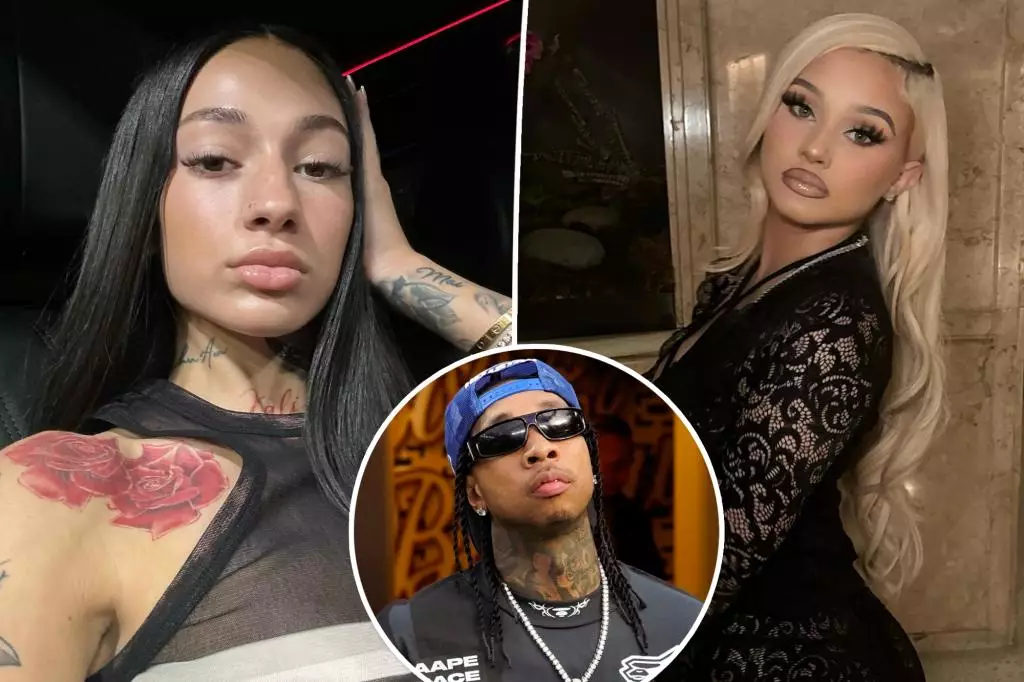The world of social media and celebrity culture often turns into a theatrical drama, filled with allegations, diss tracks, and public confrontations. Recently, Alabama Barker, the daughter of musician Travis Barker, found herself embroiled in a public spat with rapper Bhad Bhabie, also known as Danielle Bregoli. This conflict arose after Bhabie accused Alabama of various unsavory behaviors in her diss track “Over Cooked,” igniting a social media firestorm that encapsulates the increasingly blurred lines between real life and entertainment.
The crux of Bhad Bhabie’s controversy centers around allegations that Alabama was romantically involved with both Soulja Boy and Tyler, two other notable figures in the entertainment industry. These serious allegations were quickly dismissed by Alabama, who took to TikTok to assert her innocence. “Absolutely not,” she stated bluntly, emphasizing that she had “never been pregnant” by either artist and categorically denied knowing Soulja Boy altogether. Such definitive refutations signal how quickly misinformation can spiral in today’s digital age, where rumors can spread like wildfire, especially among the young and impressionable audience they cater to.
This instance also serves to highlight a tactic that influencers employ to manage their public personas. By addressing rumors head-on, Alabama has harnessed the power of social media to defend herself and control her narrative—a skill that is increasingly important for young influencers in a competitive and chaotic online environment. The public’s thirst for drama can often overshadow truth, but quick responses can mitigate lasting damage to one’s image.
In “Over Cooked,” Bhad Bhabie leverages the art of rap to articulate her grievances, turning personal conflicts into public performances. The intensity of her lyrics, including derogatory remarks about Alabama’s intentions, encapsulates a common trend in rap and hip-hop where artists use their music as a platform for personal expression and conflict resolution. However, as Bhad Bhabie’s version is now censored online, it speaks to the repercussions content creators face when their art leads to real-life legal and ethical ramifications.
Bhad Bhabie’s line about Alabama needing “daddy’s money” to confront her not only disparages Alabama’s familial connections, which includes the reality star Kourtney Kardashian, but also illustrates the pitfall of personal attacks that run the risk of becoming petty. In a world that increasingly values authenticity, drawing on such family ties may resonate poorly and come off as more harmful than humorous.
This feud exemplifies the precarious nature of fame in the age of influencers, where every comment or action can be chronicled and dissected by millions. Celebrity and influencer culture thrives on controversy—users flock to platforms like TikTok and Instagram to engage with pieces of drama that feel personal even to those on the sidelines. Alabama and Bhad Bhabie’s clash is just one incident among countless others that thrive on speculation and public opinion.
Furthermore, in the digital age, such disputes often lead to swift consequences. They can impact personal relationships, alter public perception, and even attract the attention of the law. Bhad Bhabie insinuated a threat from Alabama’s lawyer, signaling the potential for legal trouble—a reminder of the sometimes-invisible boundaries in influencer interactions.
As Alabama Barker works on her response track titled “Cry Bhabie,” the cycle of drama continues in the influencer world. The public’s insatiable appetite for drama keeps this storytelling alive, drawing followers in with each tweet, TikTok, or Instagram post. Although fans may revel in the excitement of such feuds, they often overlook the personal toll they can take on the individuals involved—magnifying misunderstandings and manipulating narratives for entertainment value.
In the end, this unfolding saga reveals a striking truth: in the realm of social media, not everything is as it appears. The boundaries of reality and performance blur continuously, leaving both fans and influencers to navigate the consequences of a world driven by engagement over authenticity.

